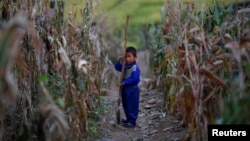The World Food Program says it distributed more than 2,500 tons of food in North Korea last month, the largest amount so far this year.
In an email sent to VOA's Korean Service, the organization’s country representative in Pyongyang, Dierk Stegen, said the food was given to 847,000 children and women who are regarded as the most vulnerable in the communist country.
It is not clear why the food distribution was higher in May than in the other months of this year.
Its nutritional aid in May, however, falls far short of the U.N. food assistance plan to distribute 10,000 tons of food every month.
WFP officials say the shortfall is due to scarce funding from the international community.
The WFP says it needs $200 million for its aid project in the North to work until June next year. But it has secured only $48 million as of early June, less than 25 percent of the required funding, according to Stegen.
Meanwhile, Pyongyang provided rations of 410 grams per person, per day in May, which consists of 20-40 percent rice and 60-80 percent maize. The WFP recommends that every person consume at least 600 grams of food on a daily basis.
North Korea, one of the poorest countries in the world, has struggled with several severe food shortages over the past 20 years.
This report was produced in collaboration with VOA’s Korean Service.
In an email sent to VOA's Korean Service, the organization’s country representative in Pyongyang, Dierk Stegen, said the food was given to 847,000 children and women who are regarded as the most vulnerable in the communist country.
It is not clear why the food distribution was higher in May than in the other months of this year.
Its nutritional aid in May, however, falls far short of the U.N. food assistance plan to distribute 10,000 tons of food every month.
WFP officials say the shortfall is due to scarce funding from the international community.
The WFP says it needs $200 million for its aid project in the North to work until June next year. But it has secured only $48 million as of early June, less than 25 percent of the required funding, according to Stegen.
Meanwhile, Pyongyang provided rations of 410 grams per person, per day in May, which consists of 20-40 percent rice and 60-80 percent maize. The WFP recommends that every person consume at least 600 grams of food on a daily basis.
North Korea, one of the poorest countries in the world, has struggled with several severe food shortages over the past 20 years.
This report was produced in collaboration with VOA’s Korean Service.





